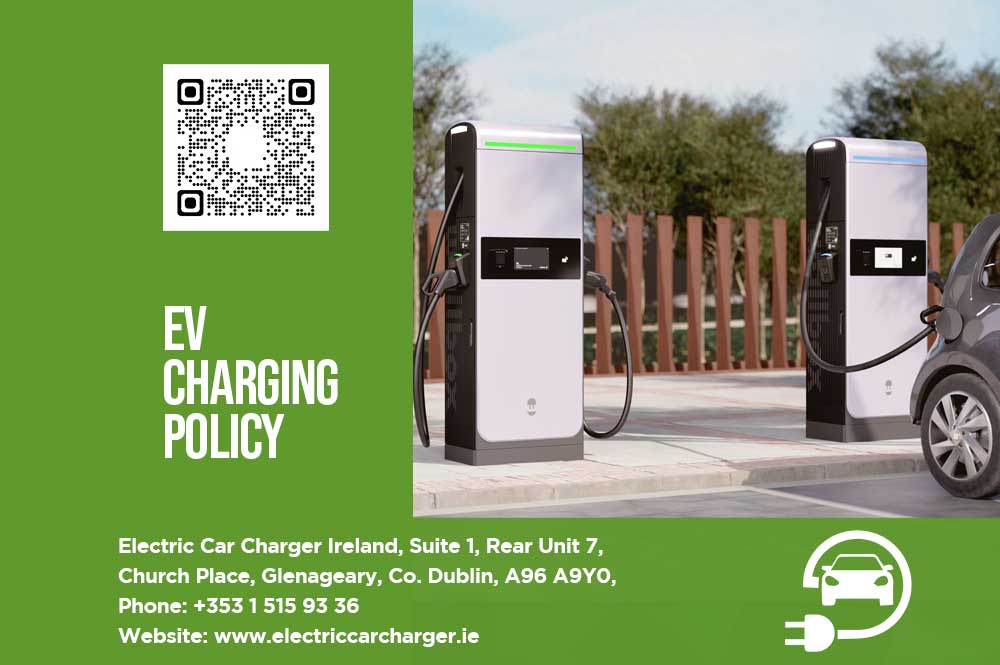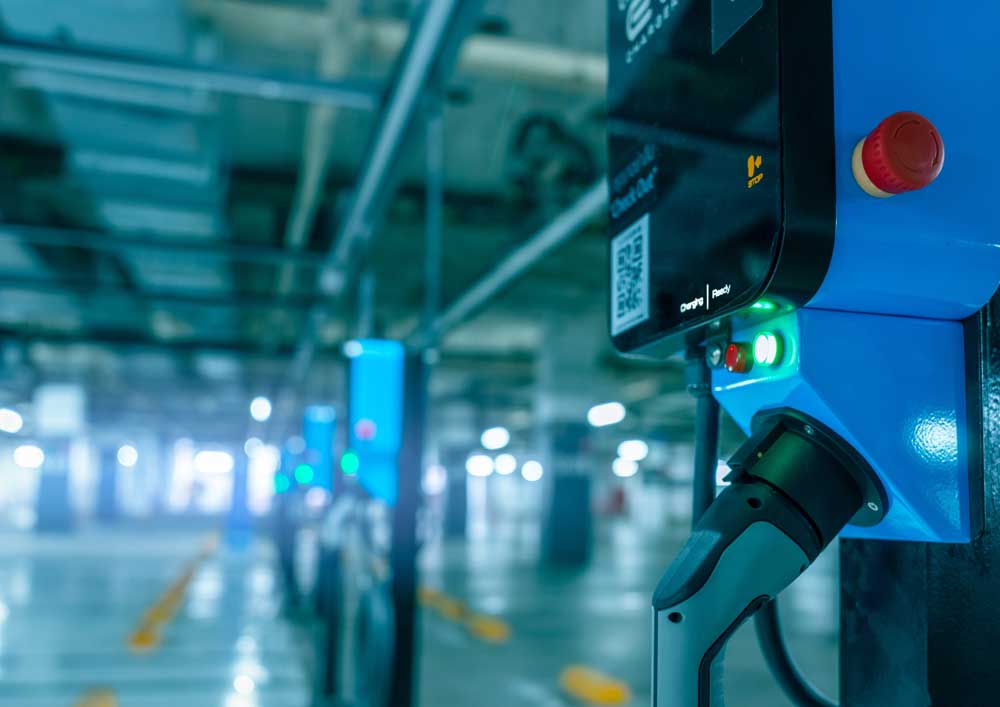Table of Contents
- Setting Charging Rates and Fees
- Charging Station Etiquette
- Installation Process for New Chargers
- Maintenance and Issue Reporting
- Liability and Legal Protections
- Conclusion
(Disclaimer: The information provided in this post is for general information only, and does not replace or substitute legal consultation with a qualified lawyer. Please always work with a legal professional to determine the appropriate content, disclaimers and liability waivers to incorporate into your EV charging policy.)
Electric vehicles have gone from a niche curiosity to mainstream acceptance seemingly overnight. EV sales are accelerating as prices drop and new models flood the market. This electric revolution is also playing out in the workplace. Forward-thinking companies are installing EV charging stations to meet employee demand and attract top talent. (More info on – EV Charging Station Contractors)
However, simply plugging in new chargers is not enough. Businesses must also implement clear policies to govern their corporate EV charging programs. Without guidelines and expectations in place, EV charging can become disorganised and contentious. Disputes over when employees can charge, how to report issues, and legal liability need to be addressed proactively. (More info on – EV Chargers Ireland)
That’s why a comprehensive EV charging policy is a must-have for any company installing on-site charging for their staff. In this article, we will outline the key elements your business’s EV charging policy should include. I’ll provide actionable recommendations on crafting effective policies around pricing, etiquette, maintenance, legal protections, and more.
Well-designed EV charging policies benefit both employees and the company. Employees enjoy smooth, convenient charging while at work. Companies maintain order, meet demand, and minimise risks. My goal is to equip you with the knowledge to implement a stellar EV charging program at your own organisation. Let’s get charging!
First, some background on the rise of EV charging at workplaces… (More info on – Electric Car Charging Points For Business)
EV Charging Policy – Setting Charging Rates and Fees
Deciding whether EV charging will be free for employees or if fees will be charged is an important upfront policy decision. Free charging can be positioned as a workplace perk and helps incentivise staff to go electric. However, providing unlimited complimentary charging to a growing number of EVs could get very expensive. The electricity costs may necessitate charging reasonable fees to recover expenses. (More info on – How Much Does It Cost To Charge An EV?)
The Upsides of Free Workplace Charging
Offering free access to charging stations provides a nice benefit that makes employees feel supported in switching to an EV. They will appreciate not having to pay fees to charge their vehicle while at work. Providing complimentary charging also demonstrates a commitment to sustainability and reducing your company’s carbon footprint. The goodwill generated and positive environmental optics may be worth the expense.
When Charging Fees May Be Necessary
As more staff drive EVs, the cumulative costs of providing unlimited free electricity and equipment maintenance can become quite high. Establishing a reasonable pricing structure may be prudent to recoup some of these costs rather than offering unlimited free charging. You will need to assess your budgetary constraints and existing electrical capacity when deciding if charging fees make sense.
Structuring EV Charging Fees
If fees will be charged, take time to develop a clear pricing scheme. Assess hourly rates or per-session charges based on average electricity rates in your region. Aim to keep rates affordable yet high enough to offset program costs. For simplicity, you could charge a flat daily rate to access charging. Discounted monthly charging permits, validated parking integration, and lower rates for employees versus visitors are other options worth considering.
EV Charging Policy – Charging Station Etiquette
To maintain orderly access to electric charging stations, the policy should clearly define etiquette expectations and prioritisation procedures:
Setting Time Limits
To prevent “charger hogging”, establish reasonable time limits that drivers can occupy a charging station per session, such as a 3-4 hour maximum while at work. Employees must move vehicles promptly once fully charged so the station opens up for the next person.
Prioritising Access
The policy should address whether employees receive priority access to charging stations over visitors. Maintaining a sign-up sheet or app for reserving charging time slots during peak demand periods is one way to manage allocation. A first come, first served policy may be simplest and fairest.
Clear Signage
Posting clear signs covering the charging etiquette rules, time limits, and waitlist procedures can quickly communicate expectations. Drivers can refer to the signs as needed.
Penalties
To reinforce charging etiquette, penalties such as temporarily revoked charging privileges or fines could be imposed on those who chronically fail to comply with the stated policy terms.

EV Charging Policy – Installation Process for New Chargers
The policy should outline the internal process for requesting and installing additional charging stations. Key steps to cover include:
Reviewing Proposals
Require a proposal detailing the charger model, electrical load capacity, number of vehicles it can service, warranty terms, and all relevant product specifications and features. Compare options from multiple vendors.
Covering Equipment Expenses
Specify upfront whether the cost of new charging equipment will be covered by the requesting department’s budget or a central corporate fund. Obtain quotes for budgetary approval.
Permitting and Installation
Perform due diligence regarding local permitting requirements, inspections, contractor selection, and parking lot design to accommodate the new chargers. Account for electrical capacity needs and ADA compliance.
Final Approval
Secure final sign-off from facilities management and executive leadership before contracting for installation.



EV Charging Policy – Maintenance and Issue Reporting
EV charging stations will need periodic maintenance and may occasionally malfunction. The policy should address required upkeep and problem resolution:
Preventative Maintenance
Schedule regular maintenance according to manufacturer recommendations. Perform monthly inspections checking for damage, loose connectors, and other issues.
Repair Logging
Track completed maintenance and any repairs, parts replacements, or software updates in a charging station service log.
Reporting Process
Provide employees a clear process for reporting non-functioning stations, equipment damage, or other issues such as via email, phone line, or work order ticket.
Response Commitment
Pledge rapid response times when charging stations are out of service, with urgent fixes completed within 24 hours. Communicate estimated timelines to minimise downtime frustrations.


Electric Car Charger Ireland, Suite 1, Rear Unit 7, Church Place, Glenageary, Co. Dublin, A96 A9Y0, | Phone: +353 1 515 93 36 – [DRIVING DIRECTIONS]
EV Charging Policy – Liability and Legal Protections
Always consult with a legal professional on incorporating liability waivers, disclaimers and terms of use to protect the company:
Assumption of Risk
Note within the policy that the use of EV charging stations is at the driver’s own risk. The company cannot be held liable for any vehicle damage or personal injuries.
Liability Release
Require employees to sign an acknowledgement and release holding harmless the company for any loss or harm to property or person that occurs when using EV charging equipment.
Terms of Use
Establish clear rules of use that drivers must abide by when charging vehicles on company property within the terms of use section.
Establishing an all-inclusive EV charging policy lays the groundwork for a successful workplace charging program. Addressing key areas like pricing, etiquette, installation, maintenance and liability upfront helps avoid headaches down the line.
Draft your organisation’s charging policies after carefully considering its needs, constraints, and goals. Seek feedback from facilities management, legal, and executives during this process and take into account budget realities, existing infrastructure and anticipated demand growth.
An effective charging policy benefits everyone involved: employees enjoy easy and hassle-free charging access while companies reduce risks and maintain order. Be fair and transparent when setting rules and fees to provide an enjoyable charging experience for employees.
As electric vehicles become more widespread, companies will adapt their charging policies and programs accordingly. Best practices could shift depending on technological advancement; to ensure flexibility for eventual changes. As our society moves toward an all-electric future, EV charging policies play a crucial role. (More info on – Electric Vehicle Home Charger Grant)



EV Charging Policy – Frequently Asked Questions
Why do I need an EV charging policy for my business?
A policy establishes guidelines on usage, costs, liability, and other aspects to prevent issues and clearly set expectations around workplace EV charging.
What should be included in an EV charging policy?
Key elements are charging fees, priority and etiquette rules, installation procedures, maintenance responsibilities, usage terms and liability disclaimers.
How do I set fair and reasonable EV charging fees?
Assess electricity costs and competitive rates in your area. Balance employee satisfaction with recovering expenses. Allow free charging or keep hourly/session rates affordable.
How can I prevent “charger hogging” at work EV stations?
Implement time limits per session, waiting lists during peak times, penalties for violations, and signs stating etiquette rules.
Should employees or visitors have priority for EV charging?
Most policies give employees priority access. However, consider demand levels and workplace culture when setting priority guidelines.
How often should I service and inspect EV charging stations?
Establish preventative maintenance schedules based on manufacturer recommendations, such as monthly inspections. Log and track all maintenance and repairs.
Related search terms: workplace EV charging policy, company EV charging policy, EV charging station policy, electric vehicle charging policy, EV charging guidelines, EV charging rules, EV charging regulations, EV charging law, EV charging legislation, EV charging compliance, EV charging etiquette, EV charging installation policy, EV maintenance policy, EV charging liability, EV charging legal, EV charging waiver, EV charging terms of use, creating an EV policy, implementing EV policy, EV charging station regulations, EV charging station law, Charging Station For Electric Vehicle.
Ever wondered about the Electric taxi grant Ireland….Check out our latest blog post for details. Read our latest blog post for details

